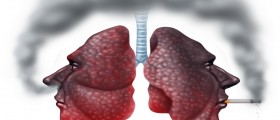
Cigarette smoking is widely popular and practiced by over one billion people in the majority of all human societies. It is estimated that about 1.1 billion people worldwide smokes tobacco every day. This is somewhere around 1/3 of complete adult population on our planet. However, dangerous health effects of tobacco do not affect only smokers but also people exposed to the cigarette smoke. It is estimated that tobacco caused 5.4 million deaths worldwide, only in 2004. In the course of 20th century, around 100 million deaths occurred as the effect of tobacco smoking. There are over 19 known chemical carcinogens in cigarette smoke, together with nicotine – a highly addictive psychoactive chemical. Here are some of the most common diseases caused by smoking tobacco.
Cancer
Cigarette smoke is loaded with various cancer causing agents, collectively known as carcinogens. These toxins can build up in the human body and cause diseases after a couple of decades. The first identified carcinogen in cigarette smoke was benzopyrene, which attaches to the cells' nuclear DNA, either killing the cell or causing a genetic mutation. The similar effect is associated with acrolein, also found in cigarette smoke. All of the 19 carcinogens in cigarettes are associated with increased risk of various cancers: lung cancer, kidney cancer, cancer of the larynx, breast cancer, and bladder cancer, cancer of the esophagus, pancreas or stomach cancer.
Cardiovascular Diseases
Tobacco smoke has serious effects on the functioning of the heart and blood vessels. Upon the exposure to tobacco smoke, the heart rates typically begin to rise while the carbon monoxide reduces the blood’s capacity to carry oxygen. Smoking increases one’s risk of heart disease, stroke, atherosclerosis and peripheral vascular disease. People younger than the age of 40 are five times more likely to suffer a heart attack if they smoke.
Chronic Obstructive Pulmonary Disease
This condition is also known as chronic obstructive lung disease (COLD), chronic obstructive airway disease (COAD), chronic airflow limitation (CAL) and chronic obstructive respiratory disease. It is characterized by chronic bronchitis and emphysema. The disease manifests in narrowed airways, limited flow of air and predominantly shortness of the breath. The lung tissue around smaller sacks of alveoli suffers destruction, making the sacks unable to hold their functional shape upon exhalation.
Other diseases caused by cigarette smoking
Smokers are at increased risk of renal damage, chronic kidney disease and diabetic nephropathy. Smokers also have a weaker immune system, and they are more prone to various colds and infections, including seasonal influenza. Smoking more than 20 cigarettes per day increases the risk of tuberculosis. Smoking is also associated with impotence, poor sperm quality and female infertility.







_f_280x120.jpg)









Your thoughts on this
Loading...